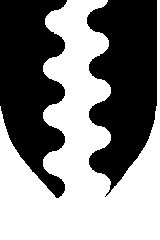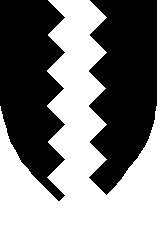Complex Lines from old Heraldic Primer
See also [[/Lines+of+Division|Lines of Division]] (full article with precedents, etc.)
A Heraldic Primer: Complex Lines -[edit | edit source]
http://heraldry.sca.org/primer/complex.html (originally by Stephen Gold, now defunct)
Lines of division and the edges of ordinaries need not be straight; they can take any of a number of decorative patterns.
Complex lines on ordinaries vs. as field divisions:[edit | edit source]
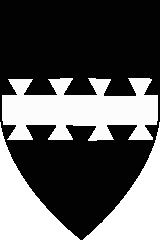
|
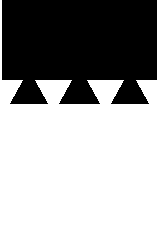
|

|

|
| Sable, a fess dovetailedargent. | Per fess dovetailed sable and argent. | Sable, a fess embattledargent.
("embattled and bretressed" adds the embattlements to the bottom also) |
Per fess embattled sable and argent. |
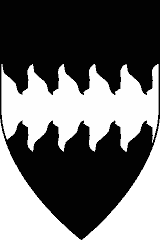
|

|

|
|
| Sable, a fess rayonny argent. | Sable, a fess urdy argent. | Sable, a fess wavy argent. |
Engrailed vs. invected:[edit | edit source]
| Engrailed and invected edges, because of their asymmetry, require special clarification.
An engrailed ordinary has semi-circular "bites" taken out of it, whereas an invected ordinary has semi-circular "bumps" added to it. Engrailed forms little cups like the holy grail. Invected lines form blister/boils as if infected. |
Sable, a fess engrailedargent. 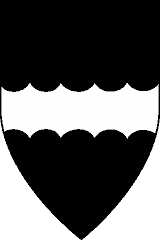
|
Sable, a fess invectedargent. 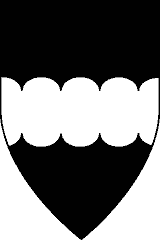
|
Sable, a chief engrailed argent. 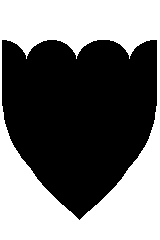
|
Divided fields engrailed:[edit | edit source]
Per fess engrailed argent and sable. 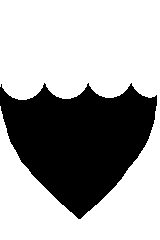
|
Per pale engrailed argent and sable. 
|
Per bend engrailed argent and sable. 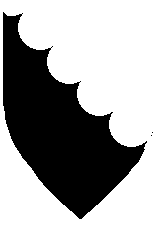
|
Per bend sinister engrailed argent and sable. 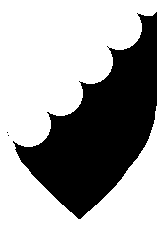
|
Per fess engrailed argent and sable. 
|
Per pale engrailed argent and sable. 
|
Per bend engrailed argent and sable 
|
Per bend sinister engrailed argent and sable. 
|
Multi-edged Ordinaries:[edit | edit source]
| In most cases, the default is for patterns to be
applied to all edges of an ordinary. For instance,
here is Sable, a pale wavy argent: |
When all edges of a multi-edged ordinary are
indented, the term "dancetty" is used. For instance,
here is Sable, a pale dancetty argent: |
In-phase vs. out-of-phase lines[edit | edit source]
| Notice that waves and dents on opposite sides of the pales above are "in phase" so that the width of the pale remains more-or-less constant.
This is generally true of complex lines applied to multi-edged ordinaries. The one exception is bretessed which is identical to embattled except that the battlements on opposite edges are 180 degrees "out-of-phase" with one another. Chevrons, fesses, and bends bretessed, naturally, have battlements on both edges. To specify that a fess, chevron, or bend has embattlements on both edges that are "in phase", the term "embattled-counter-embattled" is used. |
Sable, a pale bretessed argent: 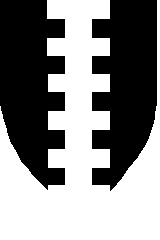
|
Sable, a pale embattled-counter-embattled. 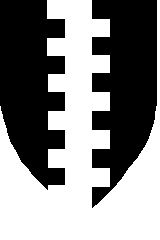
|
Precedents:[edit | edit source]
See also "A Collation of Laurel Precedents Regarding Contrast and Complex Lines" - http://www.modaruniversity.org/Complex1.htm
From the May 2006 LoAR:Mairgreg ingen Chailtigirn. Device. Argent, two feathers and on a point pointed engrailed purpure a mermaid argent. This device is returned for redraw as the point pointed is halfway between a point pointed and a per chevron field division. It must therefore be returned under RfS VII.7.a., which requires "Elements must be recognizable solely from their appearance." Drawn as per chevron engrailed this should be acceptable. Precedent states:
- [A chief triangular embattled] With very rare exceptions (e.g. in combination with enarched lines), the use of two or more complex lines on the same charge is confusing, and unattested in period armory. (Wavy raguly? Embattled rayonny? I think not.) In this case, the chief could be either embattled or triangular --- but not both. (Johann Götz Kauffman von Erfurt, December, 1992, pg. 20).
http://heraldry.sca.org/loar/2006/05/06-05lar.htmlhttp://heraldry.sca.org/loar/1992/12/lar.html
